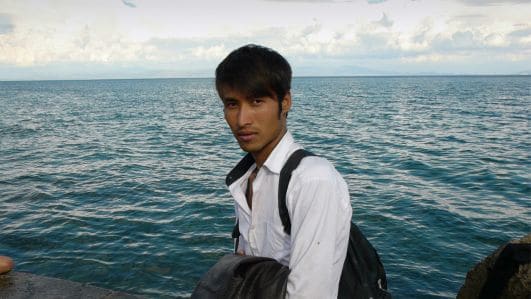Ik moet bekennen dat de lengte van die epische documentaire over de crisis in Griekenland me even deed aarzelen. Een kleine vijf uur maar liefst duurt deze rondgang langs gewone Grieken en in dat land gestrande immigranten. Mensen die plotseling heel dichtbij komen en mogen vertellen wat ze op hun hart hebben. Het gevoel achter de droge nieuwsberichten. Juist door die lange adem een indrukwekkende ervaring. Politici en beleidsmakers komen er niet in voor, behalve in een absurdistisch vormgegeven intermezzo. Hier op de Berlinale geprogrammeerd in de Panorama-sectie, maar had zeker niet misstaan in de dit jaar nogal tamme hoofdcompetitie. Geen spijt van die vijf uur.
Hoog oplopende gemoederen
Het was allemaal een beetje uit de hand gelopen, vertelde de Canadese filmmaker Sylvain L’Espérance na afloop van de voorstelling. Hij was dit project begonnen met de vraag of de Arabische lente misschien ook iets in Zuid-Europa in beweging zou kunnen brengen. Zijn research bracht hem naar Athene en hij voelde meteen dat dit de plaats was waar hij moest zijn.
Nog zonder vastomlijnd plan begon hij mensen op te zoeken en te filmen, en omdat de werkelijkheid weer telkens nieuwe, onverwachte wendingen nam bleef het werkstuk maar groeien en groeien. Het uiteindelijk gebruikte materiaal is gedraaid in de periode 2013 – 2015, een tijd waarin de gemoederen hoog opliepen, onder meer rond het referendum over het al dan niet accepteren van het Europese steunregime.
Desillusies
Met Combat au bout de la nuit neemt L’Espérance onomwonden het gezichtspunt in van de mensen die het hardst zijn getroffen. Hij loopt mee in demonstraties, filmt de tegen hun ontslag protesterende schoonmaaksters die zich zingend op de been houden, zit er middenin als de ME hard toeslaat, volgt daklozen bij hun ronde langs de vuilnisbakken, laat een dokter aan het woord over de verspilling in de zorg, is erbij als een Roma-kamp wordt gesloopt en vangt de gesprekken van gedesillusioneerde havenwerkers op die zich afvragen hoe het zo ver heeft kunnen komen. Er is geen verklarend commentaar, wel zijn er korte poëtische bespiegelingen.
Immigranten

In dit mozaïek is ook ruim plaats voor de immigranten en vluchtelingen die in Griekenland zijn gestrand en daar iets heel anders aantreffen dan de meesten hadden gehoopt. Die beminnelijke ex-leraar uit een Afrikaans land (hij durft om de veiligheid van zijn familie de naam niet te noemen) heeft nog geluk gehad. Hij krijgt zijn verblijfsvergunning, maar de pijn die hij voelt is er niet minder om. Stukje bij beetje krijgen we zijn verhaal te horen. Hoe hij te laat begreep dat zijn argeloosheid hem tot verdachte van het regime had gemaakt. Hoe hij werd opgepakt en op het nippertje kon vluchten.
Maar die jongen uit Afghanistan, nu illegaal in Griekenland, vertelt hoe hij in zijn eigen land Griekse soldaten was tegengekomen die hem bezworen dat ze als vrienden kwamen. Waar is die vriend nu, vraagt hij zich af, terwijl hij op straat moet zien te overleven. Een jongen uit Afrika heeft spijt van zijn reis. Als herder had hij een goed leven, maar ja, toen kwam de oorlog. Een ander droomt van Amerika. We zijn erbij als de volgepakte rubberboten op Lesbos landen, zien hoe een man in huilen uitbarst, maar ook hoe de kinderen ondanks alles plezier blijven maken.
Strijdliederen
Dat L’Espérance zoveel vertrouwen van iedereen kreeg wijt hij onder meer aan het feit dat hij de mensen de ruimte gaf om echt hun verhaal te vertellen. En hoewel sommige taferelen – ik denk aan de strijdliederen die de schoonmaaksters aanheffen – misschien niet in de volle lengte hadden gehoeven, is het toch juist dat kalme, ongehaaste tempo dat je het gevoel geeft er echt bij te zijn. De enigen die we misschien missen, op een korte scène na van een demonstratie na, zijn de mensen die de ultrarechtse Gouden Dageraad zijn gaan steunen.
Dat zou een andere film kunnen zijn, antwoordt L’Espérance desgevraagd. ‘Maar dat is niet mijn film.’ Om eraan toe te voegen dat het gaat om mensen die vaak alle vertrouwen in politici en andere autoriteiten hebben verloren. En die zijn er genoeg in zijn film.
Je zou kunnen zeggen dat de kracht van Combat au bout de la nuit juist schuilt in het feit dat het geen objectief relaas of afstandelijke analyse is. Of het terecht is dat het woord mafia valt is niet belangrijk. Wat we hier mogen meebeleven is hoe het in de Griekse, straten, pleinen, wachtkamers en werkplaatsen wordt ervaren. Eigenlijk zou dit verplicht kijkvoer voor alle betrokken beleidsmakers moeten zijn.
Blijft het probleem hoe met die onhandige lengte deze bevlogen onderneming buiten festivals vertoond te krijgen. Ja, daar worstelt de maker zelf ook nog mee, zo gaf hij toe. Hij sluit een hermontage in meerdere delen niet uit. Als serie op televisie lijkt mij zelf ook een goede optie, maar het onderdompelingseffect krijg je alleen in de bioscoopzaal. Zoals hier op de Berlinale.
